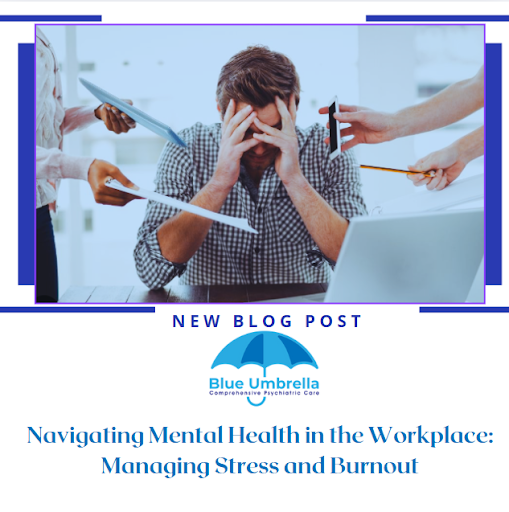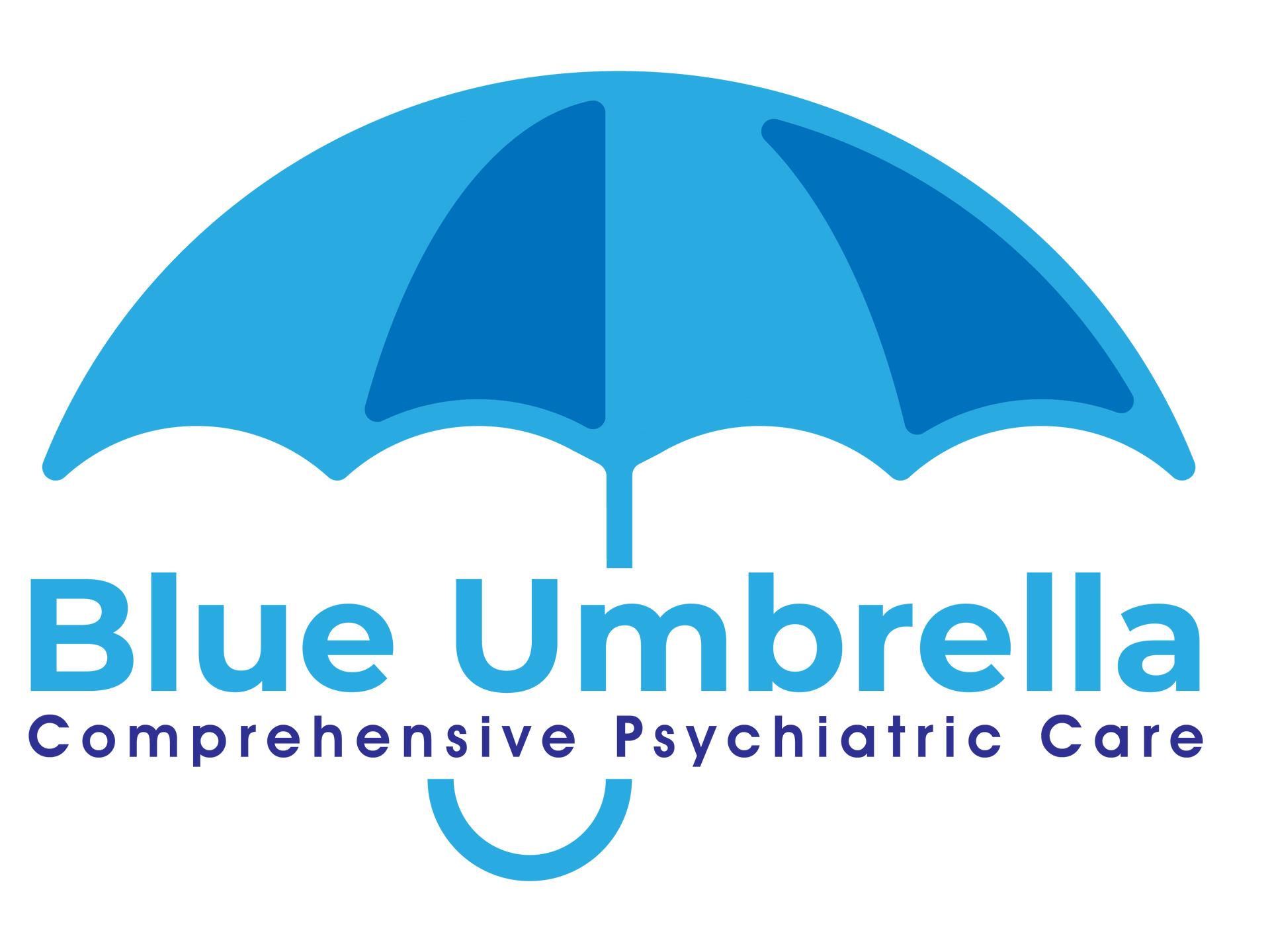
Mental health in the workplace has become an increasingly important topic in recent years, especially as work dynamics continue to shift with the rise of remote work and evolving job demands. While work is a necessary part of life, it can also be a significant source of stress and burnout if not properly managed. At Blue Umbrella Psychiatry, we understand the critical link between mental health and work performance, and we’re here to offer insights on how to manage stress and prevent burnout in the workplace.
Understanding Work Stress and Burnout
Work-related stress isn’t new, but its impact on mental health has gained more recognition over the past few years. Remote work, long hours, and the constant pressure to perform can take a serious toll on both employees and employers. In fact, studies show that work-related stress is one of the leading causes of mental health struggles, including anxiety, depression, and burnout.
According to the American Institute of Stress, 83% of US workers suffer from work-related stress. Additionally, burnout—a state of emotional, physical, and mental exhaustion caused by prolonged stress—affects over 50% of workers globally. Burnout can lead to decreased productivity, poor job satisfaction, and increased absenteeism, all of which negatively impact not only the individual but the workplace environment as well.
Recognizing the signs of stress and burnout early is essential to mitigating its effects. Some common signs include:
- Physical symptoms: Headaches, fatigue, insomnia, and muscle tension.
- Emotional symptoms: Anxiety, irritability, sadness, or feelings of helplessness.
- Behavioral symptoms: Increased procrastination, difficulty concentrating, and withdrawal from colleagues.
If left unchecked, these symptoms can escalate, leading to more severe mental health issues. However, there are steps both individuals and organizations can take to manage stress and prevent burnout.
Tips for Managing Stress and Avoiding Burnout
The good news is that there are many strategies available to help manage workplace stress and avoid burnout. These strategies focus on both individual actions and organizational changes that can create a healthier work environment.
1. Set Boundaries Between Work and Personal Life
One of the most important ways to manage stress, especially in a remote work setting, is by setting clear boundaries between your work and personal life. Without these boundaries, it can be easy to let work consume your time, leading to stress and eventual burnout.
- Define your work hours: Set specific times when you are "on the clock" and stick to them. This helps prevent work from bleeding into your personal time and allows you to recharge.
- Create a designated workspace: If working remotely, designate a specific area for work. This can help create a mental separation between your home life and work responsibilities.
- Learn to say no: It’s important to understand your limits. Saying yes to every request or task can quickly lead to feeling overwhelmed.
2. Practice Self-Care
Self-care is a powerful tool for maintaining mental health and preventing burnout. While it may seem difficult to prioritize self-care with a busy work schedule, it’s crucial for maintaining a healthy work-life balance.
- Take regular breaks: Short breaks throughout the day allow you to recharge and refocus. Try the Pomodoro Technique, which involves working for 25 minutes, then taking a 5-minute break.
- Get physical: Exercise releases endorphins, which improve mood and reduce stress. Even a short walk or stretching can help ease physical tension and clear your mind.
- Eat well and sleep well: A balanced diet and proper rest are essential for overall mental health. Avoid excessive caffeine and make sure you’re getting enough sleep each night.
3. Seek Support and Communicate
Managing work stress and preventing burnout is not something you have to do alone. It’s important to reach out for support when needed. Whether through colleagues, friends, or mental health professionals, having a support system in place can help alleviate stress and prevent burnout.
- Talk to your supervisor: If you’re feeling overwhelmed, have an open conversation with your manager about workload and expectations. A supportive employer will help adjust the workload or offer additional resources to prevent burnout.
- Utilize employee assistance programs (EAP): Many workplaces offer EAPs that provide counseling services and resources for stress management. Don’t hesitate to make use of these programs if available.
- Consider therapy or counseling: Sometimes, it can be helpful to talk to a therapist or counselor about work stress. Therapy can help you learn coping strategies, process emotions, and work through workplace challenges in a safe and supportive environment.
Creating a Mentally Healthy Work Environment
While individuals can take steps to manage stress, the work environment itself also plays a significant role in mental health. Workplaces can foster a mentally healthy environment by promoting positive behaviors and providing support systems for employees.
1. Promote Work-Life Balance
Organizations should encourage employees to maintain a healthy balance between their professional and personal lives. This can include offering flexible work hours, remote work options, and sufficient time off for rest and recovery. Supporting work-life balance can reduce the risk of burnout and increase overall job satisfaction.
2. Provide Mental Health Resources
Employers can offer resources to help employees manage stress, such as workshops on stress management, access to counseling services, and mental health days. By acknowledging the importance of mental health, organizations can create a culture where employees feel safe seeking help without fear of stigma.
3. Foster a Positive Work Culture
A positive and supportive work culture encourages collaboration, transparency, and mutual respect. When employees feel valued and supported, they are less likely to experience feelings of burnout and more likely to thrive in their roles. Regular check-ins with employees, team-building activities, and recognition of accomplishments can go a long way in fostering a positive work environment.
The Bottom Line: Why Mental Health Matters in the Workplace
The importance of mental health in the workplace cannot be overstated. By taking steps to manage stress and prevent burnout, employees can improve their overall mental health, productivity, and job satisfaction. Additionally, organizations that prioritize mental health create a more engaged, motivated, and resilient workforce.
At Blue Umbrella Psychiatry, we understand the impact that work-related stress can have on mental health. If you’re struggling with stress, burnout, or other mental health concerns, we’re here to help. Our team offers a wide range of services, including therapy, medication management, and treatment for conditions like anxiety, depression, and burnout.
To learn more or schedule an appointment, call
Blue Umbrella Psychiatry today at
954-341-5215. Let us help you navigate mental health challenges in the workplace and beyond.













